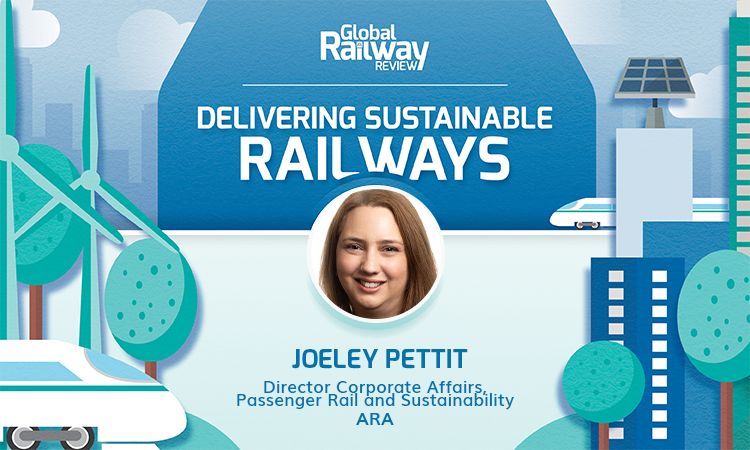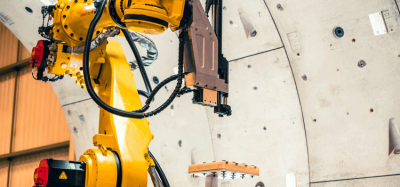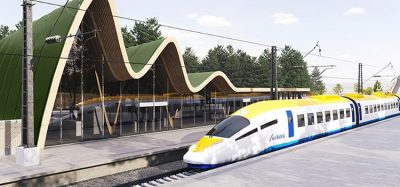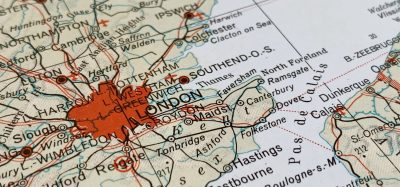Q&A with ARA’s Joeley Pettit: Delivering Sustainable Railways
Posted: 4 April 2023 | Joeley Pettit | No comments yet
For Global Railway Review’s exclusive Delivering Sustainable Railways feature series, Joeley Pettit, Director Corporate Affairs, Passenger Rail and Sustainability for ARA, discusses the latest ARA sustainability projects and the future of sustainability in rail.


Can you talk about the importance of sustainability for the ARA?
Sustainability is one of the ARA’s key strategic priorities and it is embedded in everything we do.
Rail will play a vital role in supporting Australia and New Zealand’s sustainable future and the ARA is working very closely with our members to support information sharing, showcase best practice and help address some of the policy issues that will ensure we can meet some of the key sustainability challenges of the next decade.
The ARA is committed to demonstrating the outstanding sustainability leadership that already exists in our industry, while also driving further change to support continued progress of key sustainability issues, from our journey to net zero and building resilience to fostering diversity and inclusion in our industry.
What are some of the latest sustainability projects that the ARA have been working on?
In 2022, the ARA released new research on accelerating decarbonisation in the transport sector. The project was delivered in partnership with Roads Australia and the Infrastructure Sustainability Council and sets out a wide range of recommendations to support and accelerate decarbonisation. Placemaking, a national approach to planning and design and the need for rapid technology and innovation adoption are among the focus areas of the report and we continue to advance those recommendations in partnership with industry.
We are also exploring opportunities to support the decarbonisation of rolling stock in the rail industry, bringing together industry representatives to consider the policy and regulatory requirements, supporting infrastructure and energy needs, and transition planning to move towards decarbonised rail. There are some fantastic trials and research underway, but a coordinated, national approach will be needed to ensure a fast and smooth transition. This work is critical to the future of our industry.
Resilience remains a strong focus, with the industry responding to a range of extreme weather events in both Australia and New Zealand recently. Ensuring we plan, upgrade and develop our network to be resilient in the face of these events, as well as ensuring greater redundancy in the national network, is a key focus.
What are some sustainability milestones that the ARA have reached?
The ARA launched its first sustainability strategy in 2021 and is advancing a three-year programme of work to support its implementation. We have been pleased with the strong industry support and engagement the strategy has received to date and are continuing to progress those commitments.
Rail has the opportunity to be at the heart of sustainable communities and enable people to live rich and rewarding lives.
Our ‘Journey to Net Zero’ report was a key achievement, particularly given it reflected collaboration with the wider infrastructure sector. Sustainability is an issue that transcends our industry, so this wider engagement will be essential to making a meaningful impact.
We held our first Rail Sustainability Conference in 2022 to promote information sharing in the industry and received a fantastic response from those attending. We are now implementing new events, such as a circular economy workshop, to maintain that momentum with our members. Being able to provide that network and forum for information sharing and leadership is a crucial part of how we can support our members in advancing their own sustainability programmes.
In your view, what are some of the biggest barriers when it comes to increasing sustainability in rail?
In Australia, state-based approaches to everything from local content, procurement and type approvals do create inefficiency in the industry and can limit research and innovation. Achieving net zero is one of the most significant challenges of our time and we will need a well-coordinated, national approach to realise this. So, addressing some of these traditional challenges faced by the rail industry will be critical.
Can you tell us about some of challenges that ARA have encountered in regard to sustainability targets? And how did you overcome them?
The ARA has not set targets itself but is instead focused on working with members to build their sustainability capability. Our focus has been on supporting organisations of different sizes and areas of specialisation, so that collectively we can make an impact across the entire rail supply chain. Providing training, resources and opportunities to share information and best practice are key to supporting all industry participants.
What does the future of sustainability in rail look like to you?
Rail will play an integral role in our sustainable future. Greater use of rail for both passenger and freight services will be an essential part of our net zero future.
Rail has the opportunity to be at the heart of sustainable communities and enable people to live rich and rewarding lives. It also has the opportunity to be at the forefront of the technology and innovation that will drive more sustainable outcomes.
If we make the most of the strong investment in rail at the moment and take advantage of the chance to embed measures that will reduce emissions, improve circularity and support long term efficiency, rail will be an even more essential part of our daily lives in the future.
It is an exciting time for the industry to be a part of our journey to net zero.


If you would like to take part in our Delivering Sustainable Railways feature series, or would like to nominate a colleague, please email: Elliot Robinson, Editorial Assistant, Global Railway Review.
Related topics
Cargo, Freight & Heavy-Haul, Regulation & Legislation, Sustainability/Decarbonisation, Technology & Software







